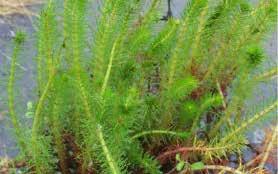
1 minute read
Aquatic plants for attracting wildlife
Plants are an essential component for water habitats like ponds as they attract more species and can be a critical source of water and shelter. While a variety of local, native plants is best, it is important to do your research. Consider the water depth, sunlight and temperature requirements of individual species to ensure you select the species best suited to your pond or waterbody.

Free-floating plants sit on the surface with hanging roots. Examples include Azolla and Duckweed (Wolffia australiana).

Submerged plants grow partly or completely underwater. Examples include Water Ribbons (Cycnogeton procerum) and Eel Grass (Vallisneria australis).
Bog Plants (Myriophyllum crispatum) Image courtesy of Em Bowman
Marginal/Bog plants are the most important as they attract insects and birds, and are best suited for small ponds. Examples include Brachyscome paludicola and Myriophyllum crispatum. Deep-water plants have leaves that typically float on the water surface with roots growing in the soil below. Examples include Ottelia (Ottelia ovalifolia), Nardoo (Marsilea mutica) and Running Marsh Flower (Ornduffia reniformis).

Visit Birds in Backyards for more details on the best way to set up your pond to attract native wildlife.
Have you ever wondered what happens to your clean-up materials?
General waste material collected from Council clean-up bookings is taken to Bingo’s Eastern Creek Facility where the material is sorted and, where possible, recovered for recycling. The remaining waste is compacted and disposed of in landfill.
HOUSEHOLD CLEAN-UP
COLLECTION SERVICE
Book Online
Metal collection is taken to Liberty Steel in Chipping Norton for recycling.
Mattresses are collected and processed by Soft Landings. The mattresses are shredded with the metal recovered. The soft parts of the mattress are recycled into items such as carpet underlay.
www.liverpool.nsw.gov.au/ householdcleanup
Call Customer Service
1300 36 2170
Open Monday – Friday, 8.30am – 5pm







